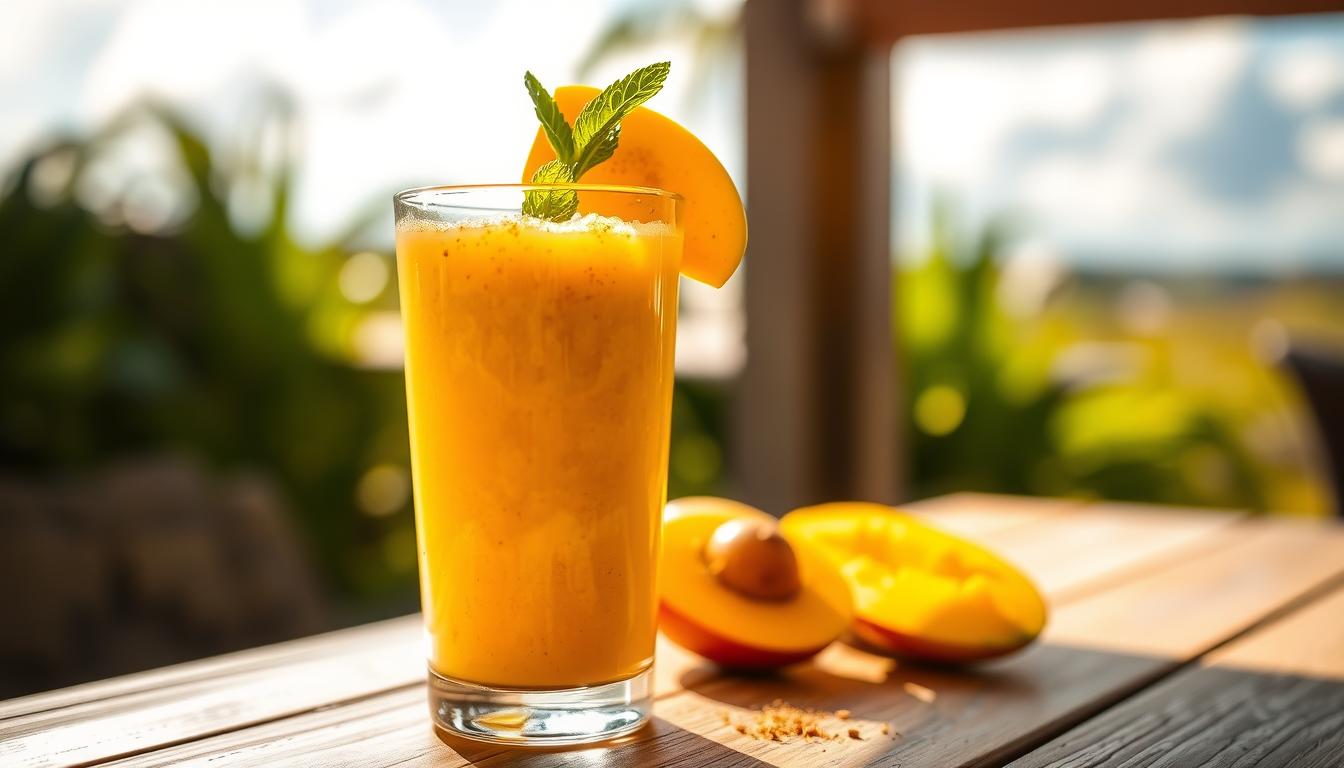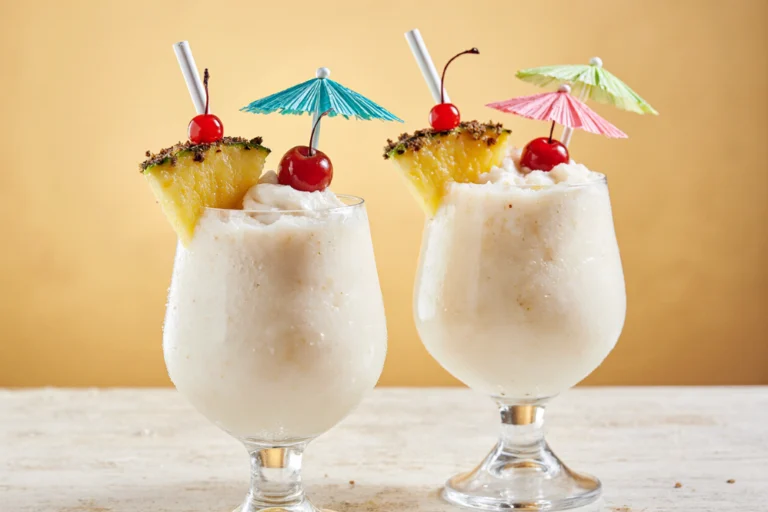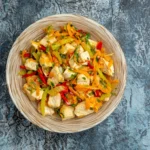As the summer sun rises, you’re likely looking for a refreshing breakfast that’s both nourishing and delicious. Imagine starting your day with a cool, creamy mango smoothie that combines the sweetness of tropical flavor with the goodness of a healthy breakfast.
Mango smoothies are not just a treat for your taste buds; they’re also packed with nutrients, making them an ideal way to kick-start your morning. With the versatility to customize your smoothie with various ingredients, you can enjoy a different flavor every day.
Whether you’re in a hurry or enjoying a leisurely morning, these smoothie recipes are quick to prepare, saving you time. Plus, they’re a great way to keep you hydrated during the hot summer months. In this article, we’ll explore various mango smoothie variations that you and your family can enjoy together, making mornings a little brighter and a lot more delicious.
Listen to our podcast about this article
Table of Contents
The Perfect Summer Breakfast Treat
With the rise in temperature during summer, a mango smoothie can be your perfect breakfast companion, offering both refreshment and nutrition. Mango smoothies aren’t just tasty—they’re full of good-for-you nutrients too!
Why Mango Smoothies Are Ideal for Hot Mornings
Mango smoothies are particularly refreshing on hot summer mornings due to their cooling properties. The natural sweetness of mangoes eliminates the need for added sugars, making them a healthier choice. Additionally, the hydrating properties of smoothies make them ideal for hot weather.
- Mango smoothies provide a cooling effect, perfect for hot mornings.
- Mangoes have natural enzymes that can give your digestion a helpful boost in the morning.
- Smoothies make it super easy to get your daily dose of fruit without much effort.
Health Benefits of Starting Your Day with Fruit
Starting your day with fruit like mangoes provides natural energy without the crash associated with processed breakfast foods. Mangoes are rich in vitamins A and C, and fiber, contributing to a nutritious breakfast. When combined with protein sources like yogurt, they create a balanced breakfast.
- Mangoes are a great source of Vitamin A, Vitamin C, calcium, and iron, giving you a tasty way to get those important nutrients!
- A serving of mango smoothie typically provides around 215 calories with 47g carbohydrates, 8g protein, and 5g fiber.
- The combination of fruit with protein sources creates a balanced breakfast.
Essential Ingredients for a Classic Mango Smoothie
To whip up the perfect mango smoothie, you’ll need a few key ingredients. Choosing good-quality ones makes all the difference in flavor and texture.
Choosing the Best Mangoes: Fresh vs. Frozen
For a classic mango smoothie, feel free to use either fresh or frozen mango. An average 12-ounce fresh mango yields about one cup of cubed fruit, while you’ll need two cups of frozen mango cubes. Frozen mangoes create a thicker, colder smoothie. Choose ripe mangoes by looking for a slight give when pressed and a sweet aroma.
- 🥭 Fresh mango (about one cup of cubed fruit)
- ❄️🥭 Frozen mango cubes (about two cups)
Supporting Ingredients That Enhance Flavor
- 🍦 Yogurt (or dairy alternatives)
- 🥛 Milk (or dairy alternatives)
- 🍌 Banana
Other ingredients that enhance the smoothie’s flavor and creaminess include yogurt, milk, and banana. You can opt for dairy alternatives if you have dietary restrictions. Tossing in a banana makes your smoothie extra creamy and adds a touch of natural sweetness.
Equipment You’ll Need
A blender is the primary equipment you’ll need to make a mango smoothie. Choose a blender that can handle frozen fruit and has sufficient power to blend your ingredients smoothly.
Basic Mango Smoothie Recipe
With the right ingredients and a few minutes, you can enjoy a refreshing mango smoothie at home. This simple mango smoothie recipe is perfect for busy mornings.
Ingredient Measurements
- 🥭 2 fresh mangoes or 2 cups frozen mango
- 🍌 1 small frozen banana (or half of a large one)
- 🥛 ½ cup milk (dairy or dairy-free)
- 🍶 ½ cup yogurt (dairy or dairy-free)
The key to achieving the perfect consistency is using the right proportions of these ingredients.
Step-by-Step Blending Instructions
Add all the ingredients to a high-powered blender and blend until creamy. If you’re using frozen ingredients, you may need to use the tamper to ensure everything blends smoothly. The whole thing comes together in just a few minutes.. Adjust the thickness by adding more liquid or frozen ingredients as needed.
Creamy Mango Smoothie Variations
Elevate your mango smoothie experience by incorporating creamy elements that not only taste great but also provide nutritional benefits. You can achieve a richer texture by using various ingredients that enhance the smoothie’s overall quality.
Yogurt-Based Options
Using full-fat Greek yogurt is an excellent way to create an ultra-thick and creamy mango smoothie. The high protein content in Greek yogurt not only adds to the smoothie’s creamy texture but also boosts its nutritional value. You can also experiment with flavored yogurts to add a different twist to your mango smoothie.
Coconut Milk Alternatives
For those looking for dairy-free options, coconut milk is a fantastic alternative that adds a tropical flavor to your smoothie. You can use frozen coconut milk ice cubes for an even thicker consistency. This substitution maintains the creamy texture while catering to dietary restrictions.
Protein-Packed Additions
Adding protein powder or nut butters to your mango smoothie can enhance its nutritional profile without compromising its texture. These protein-rich additions make your smoothie more filling and satisfying, perfect for a post-workout snack or a quick breakfast.
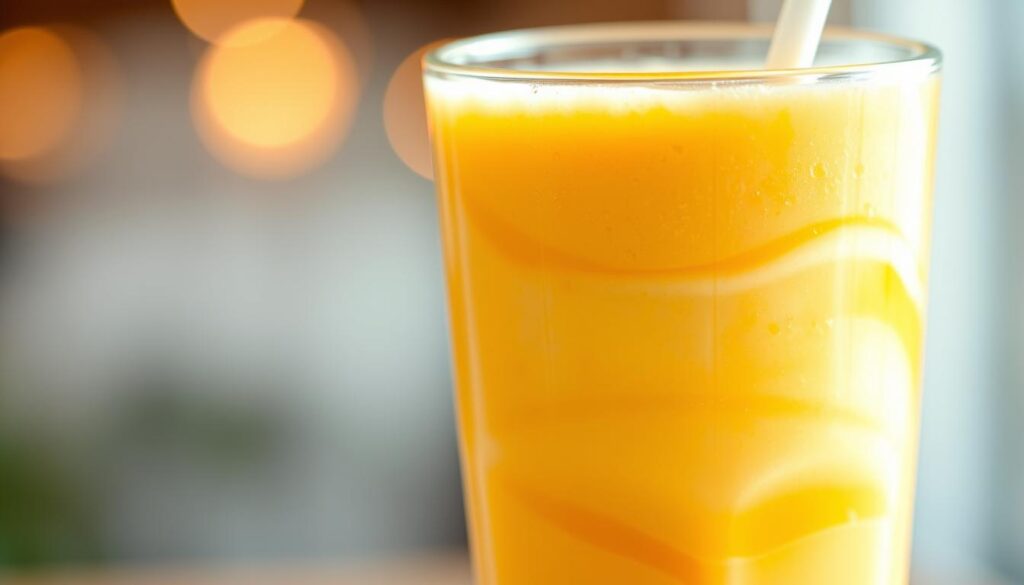
Tropical Mango Smoothie Combinations
Give your mango smoothie a tropical twist with these refreshing flavor combos. You can create unique and delicious variations by incorporating other fruits and flavors that complement mango perfectly.
Mango-Pineapple Paradise
Combine 1 cup of fresh or frozen pineapple with your mango to create a mango-pineapple smoothie that tastes like a tropical getaway. Pineapple adds a tangy flavor and extra nutritional benefits, making this blend a great choice.
- 🥭 Mango (fresh or frozen)
- 🍍 Pineapple (1 cup, fresh or frozen)
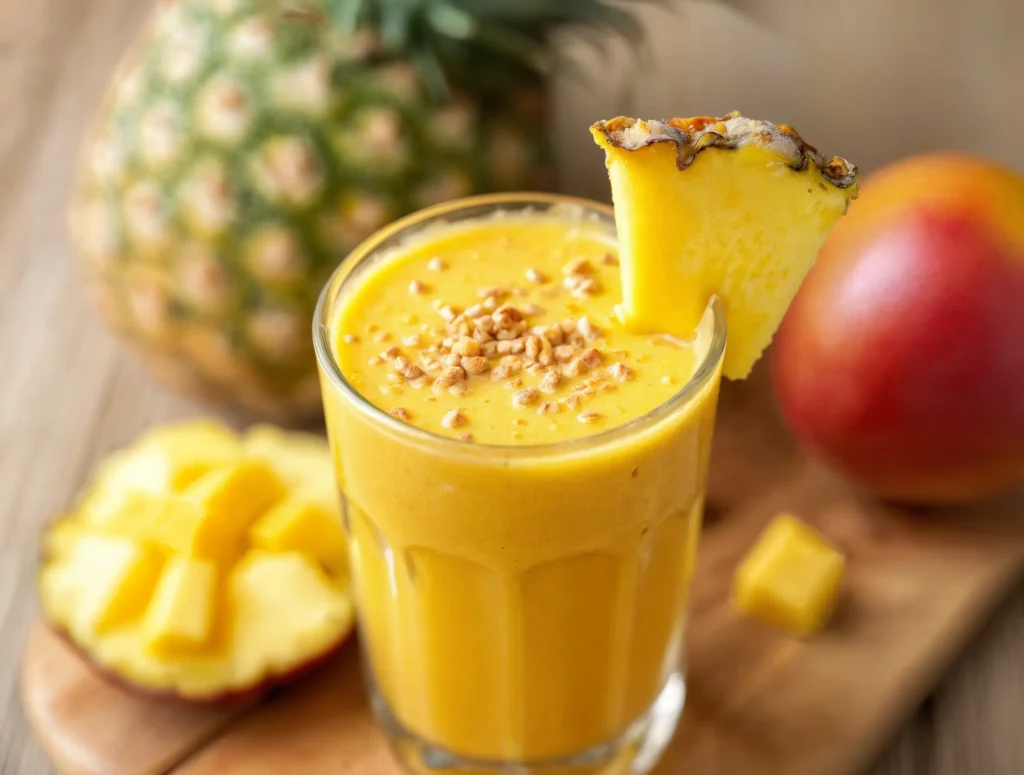
Mango-Banana Blend
Bananas complement mangoes well, adding creaminess to your banana smoothie. For an optimal blend, use a 1:1 ratio of mango to banana. This combination enhances the texture while adding potassium and other essential nutrients.
- 🥭 Mango (use equal parts with banana)
- 🍌 Banana
Citrus-Infused Mango Smoothies
For a zesty kick, swap the milk for orange juice or add a splash of fresh lime juice to brighten up your mango smoothie. Citrus fruits like orange, lime, and lemon enhance the mango flavor while adding a boost of vitamin C. Try garnishing with a coconut rim for a tropical touch.
These tropical combinations will elevate your mango smoothie game and provide you with refreshing and healthy drink options. Experiment with different fruits and flavors to make mango smoothies that suit your taste preferences.
Nutritious Add-ins to Boost Your Mango Smoothie
Boost the nutritional value of your mango smoothie with these healthy and tasty add-ins. You can easily enhance the flavor and nutritional content by incorporating a few simple ingredients.
- 🥭 Mango
- 🍊 Orange juice (as a milk substitute)
- 🍋 Lime juice (freshly squeezed)
- 🥥 Coconut (for garnish — coconut rim)
Superfood Enhancements
Superfoods like chia seeds and ground flaxseed can be added to your smoothie to increase the fiber content. These add-ins not only boost the nutrition but also pair perfectly with the sweet mango flavor.
Vegetable Additions That Don’t Compromise Taste
You can create a green smoothie by adding a handful of kale or frozen spinach without significantly altering the taste. Frozen cauliflower is another option that adds nutrition without changing the flavor.
Seed and Nut Options
Nuts like peanut butter or almond butter add protein and healthy fats to your mango smoothie. You can also experiment with other nuts and seeds to add texture and nutrition.
- 🥜 Peanut butter (1–2 tablespoons)
- 🌰 Almond butter (1–2 tablespoons)
- 🥄 Other nut or seed butters (optional)
- 🌱 Chia seeds (1 tablespoon)
- 🌾 Ground flaxseed (1 tablespoon)
- 🥬 Spinach or Kale (handful)
- Add 1 tablespoon of chia seeds or ground flaxseed for an extra dose of fiber.
- Mix in a handful of spinach or kale for a nutrient-packed green smoothie.
- Use 1-2 tablespoons of peanut or almond butter to add protein and healthy fats.
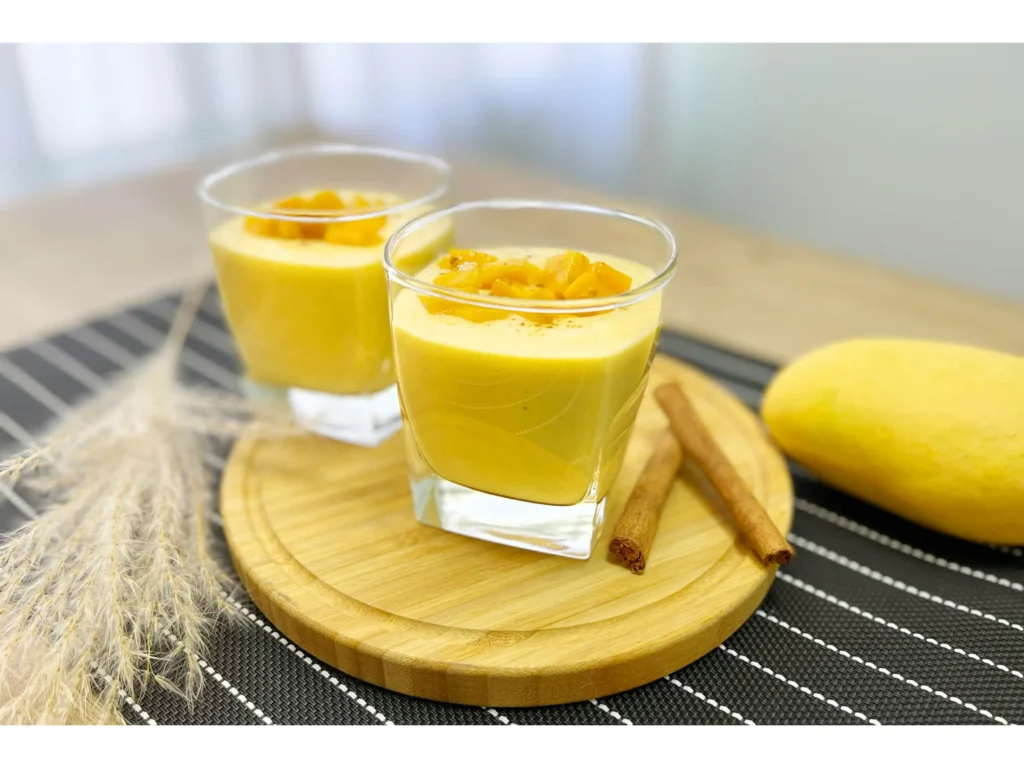
Troubleshooting Common Mango Smoothie Problems
Encountering issues with your mango smoothie? Let’s troubleshoot the most common problems together. Making a great mango smoothie is about balance and technique.
Fixing Texture Issues
Adjusting the liquid amount can fix texture problems. Add more liquid for a thinner consistency or more frozen ingredients for thickness. This simple tweak can make your smoothie blend smoothly.
Balancing Sweetness Naturally
If your mango smoothie isn’t sweet enough, try adding a teaspoon of honey or maple syrup, or use naturally sweet fruits like a ripe banana. Different mangoes vary in sweetness, so adjust accordingly.
- 🍯 Honey (1 teaspoon)
- 🍁 Maple syrup (1 teaspoon)
- 🍌 Ripe banana (naturally sweetens and adds creaminess)
- 🥭 Mango (adjust based on variety and sweetness level)
Storage Tips for Leftover Smoothies
Pour leftover smoothies into a mason jar with minimal air space and refrigerate for up to 24 hours. This helps maintain freshness and prevents separation.
You may also like: Mango smoothie variations for summer morningsConclusion
Embracing the mango smoothie trend can revolutionize your summer mornings with a healthy and tasty twist. You’ve explored various mango smoothie recipes, from classic to tropical and nutritionally enhanced options, allowing you to customize your breakfast to your taste. With almond milk or coconut as bases, and the option to add frozen mango for a thicker texture, the versatility is vast. Kick off your day with a nutrient-rich smoothie and savor its refreshing flavor all summer long. Experiment with different combinations to make your mornings special.

